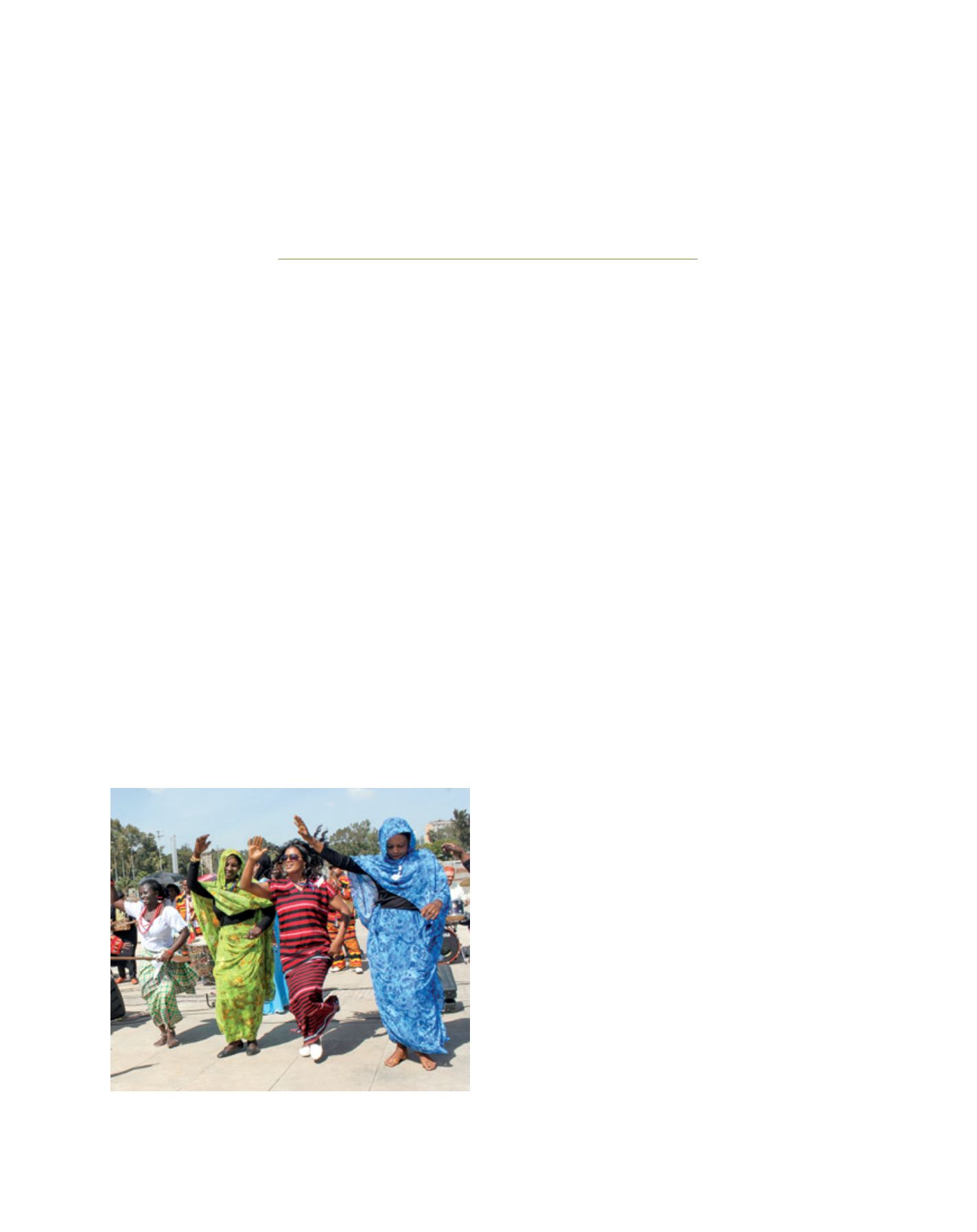

[
] 158
Initiatives of the African Union Commission
in promoting cultural diversity
for peace in the continent
Angela Martins, Head of Culture Division, Social Affairs Department, African Union Commission
T
he African Union has several fundamental initiatives
for the promotion of cultural diversity in Africa. These
include building a culture for peace and other similar
African Union programmes to contribute to the building of a
prosperous, peaceful Africa that is driven by its own citizens
and is a strong force in the global arena.
Culture concerns itself with socially transmitted behaviour
patterns, arts, beliefs, institutions and all other products of
human work and thought. Culture includes intangible and
tangible heritage which is varied, complex and in constant
evolution. The tangible heritage includes monuments or
architecture, art and crafts, sites, manuscripts, books and
other objects of artistic and historical interest. The intangible
heritage includes language, performing arts, music, festive
events, rituals, social practices, traditional craftsmanship and
knowledge, among other things.
Africa is endowed with a rich and diverse cultural heritage as
well as extraordinary ethnic cultural diversity. Much of Africa’s
cultural activity centres on the family and the ethnic group. Art,
music and oral literature serve to reinforce existing religious
social patterns. Communities range from rural cultures in which
cuisine, religions, dress, tribal roles and daily life have remained
unchanged for hundreds of years, to modern city environments
which feature a diverse mix of cultural influences. Music, art
and literature are culturally important and distinctive through-
out Africa, and have had considerable impact on other societies
around the world as well within the continent.
The Charter for African Cultural Renaissance adopted in
2006 by the 6th Session of the African Union Assembly of
Heads of State and Government regarding African cultural
diversity, identity and renaissance states that African states
recognize that cultural diversity is a factor for mutual enrich-
ment of peoples and nations. Consequently, they commit
themselves to defend minorities, their cultures, their rights
and their fundamental freedoms. It also states that cultural
diversity contributes to the expression of national and regional
identities and more widely to building Pan-Africanism.
Building a culture for peace
The development and sustenance of peace has been a focus of
concern for African leaders for several decades. The achieve-
ment of a culture of peace is an important pillar in the quest
for development, progress and the building of a prosperous
and peaceful Africa that is driven by its own citizens, and
which can be a strong force in the global arena.
All sectors of society, including the youth, have a critical
role to play for peace to be achieved. Pre-colonial Africa was
organized by effective peacemaking traditions of dialogue
and mediation starting at the local community level. These
traditions were based on respect for the wisdom and value of
elders (both men and women). It should be recognized that
African people, with their unique peacemaking traditions, can
make a major contribution to Africa’s peace processes and
the world historical transition to a culture of peace. The role
of traditional and spiritual leaders is critical in finding ways
and means to develop Africa’s own remedies and solutions
for conflict prevention, management and the promotion and
sustenance of a culture of peace in the continent. A culture
of peace should be a culture of human rights. The Universal
Declaration of Human Rights is the fruit of a reflection on the
destruction that is the result of war.
The African Union is devoted to the promotion of a culture
of peace in the continent by assisting in resolving a number
of conflicts and potential threats to peace and stability in
Africa. The role and activities carried out by the Panel of the
Women dancers learning an Ethiopian dance: music, art and literature
are culturally important and distinctive throughout Africa, and have had
considerable impact on other societies around the world
Image: African Union
A
gree
to
D
iffer

















